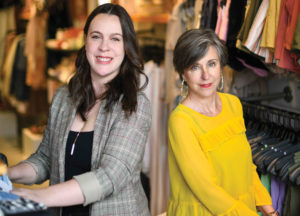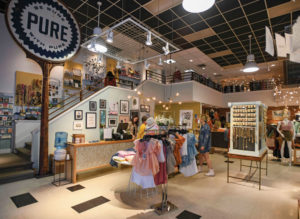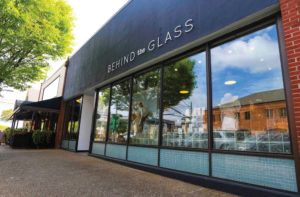
One block from Toomer’s corner in Auburn is a small business that’s something of a landmark itself — particularly for university women.
“Definitely, for anybody who succeeds in downtown Auburn, their customers are going to be about 70 percent students,” says Donna Young, the founder and owner of Behind the Glass, perennially named by The Plainsman as “Best Women’s Clothing Store.”
Knowing what that 70 percent is collectively craving has been Young’s secret, going back to when she was studying for her Auburn baccalaureate in art and English in the days of free speech and tie-dye.
Today, the fashion leader is Free People, a boho young women’s line that grew out of Urban Outfitters.
“When I was that age, I would have loved a brand like Free People,” says Young, who pegs her store’s close relationship with the brand as one of its best assets. “I went around in the ’70s in long dresses, jeans, overalls, cargo pants — all those trends that have all come back, including flares and ’60s prints.”
Other top lines in the store are Jack by BB Dakota, Show Me Your MuMu and Z Supply.
Merchandizing has become a carefully practiced craft over the years, but that’s not how this still-growing small business got started. It was more cobbled together like a ’70s outfit.
“At the time we started, I was married, and it was something that my husband and I wanted to do at the time.”

Owning their own business was what they wanted, but settling on the exact “something” of the enterprise took time.
“The building became available, a two-story building downtown, a great opportunity, and we sort of fell into it,” Young says.
It was 1987, and downtown retail had been drained by the burbs, after the opening of the Auburn Mall in 1973. The two-story building on Magnolia Avenue that they snapped up had been Parker’s Department Store.
“Except for the Ware Building, it’s the biggest space downtown,” Young says. “It’s across from AuburnBank and one block from campus.”
Location, location, ok. What about product?
“When we opened, we had a cafe and art gallery,” Young says. “Actually, we put more of our faith into the food. There were not many places to eat, and the food was a bigger draw in the beginning, and the other grew as we went along.
“The art was always just for decoration and to make it interesting. The food made the money in the beginning. I always ran the retail (gifts and art) and my husband ran the cafe, and, then, he decided he didn’t want to do that anymore. I always liked clothes and fashion. It transformed from a gift shop into a boutique.”

Even then, the transformation was “trial and error,” Young says. “We went to the markets in Atlanta when it was not even market day, just showed up there and some people would help us,” recalling the start of her training by immersion in the wholesale trade shows at AmericasMart Atlanta.
“The most important trade shows for fashion are in Atlanta and Vegas,” says the general manager of Behind the Glass, Chloe Young Floyd. “New York used to be the biggest city for fashion shows, but now Vegas is the big deal.”
Chloe is Donna’s daughter, who has been working at the store since even before she went on the payroll at age 13. She is an Auburn graduate with a major in apparel merchandizing.
“Actually, it’s more vice versa,” says Chloe, about the help she got from schooling. “My experience at Behind the Glass helped me in school. I learned important things at college, but on-the-job lessons were the most valuable.
“When I was 18 years old I was general manager, in charge of all the staff management, and since junior high I have been buying for the store.
“I learned from my mother as a spectator since I was 13 or 14. I learned through her visual merchandising. She has such an eye for the merchandise and how it is presented and keeping up on what does well and what doesn’t.”
Founder Young has been slowly spending less time at the store, but she still keeps an eye on the competition, which has been steadily growing since the reversal of the retail flight from downtown.
“There are more shops downtown than there used to be, but we’ve been here longer, and we’re bigger, have more of a selection. We’re sort of a mini department store,” Young says.

And keeping up with the online competition has not gone unattended. “Website sales right now are about 10 percent of total but growing,” Young says. “I think the main thing that will change in the near term is continued increase in online sales, and we’re always trying to use social media better and grow Facebook and Instagram followers.
“We have a social media team, four people, and an e-manager for the website. We do photo shoots every week, on location. We take models to locations in town. The photo shoots involve the same team as the social media team. And I’m on that team, as well.”
Making things happen in the store, however, is still a big part of this small business success.
“That’s really important to us, to have really good music, a fun atmosphere, to have events in the store and customer service that’s friendly and helpful,” Young says. “We try to change up things and have something that’s new and fresh, to make it a place that is really fun to go to, where they can run into their friends. That’s a really important part of what we do.
“And customers want to have someone who can suggest things. You can’t get that online.”
The biggest event is football season, which can be a windfall, but a good share of total annual sales is always riding on team spirit. “We are fortunate that Auburn is a bubble, but that means how the football team is doing impacts the area,” Floyd says. “The better they do, the more people come downtown. If they are not playing well, people are not willing to travel. And if it’s not a good season and they are not going to the game, they are not looking for new outfits.”
The constant that offsets such vagaries seems to be a lot of hard work. Behind the Glass is open seven days a week and employs on average 30 workers — 20 part-time rising to 25 at peak fall season, and six full-time.
As for the founder, “I’m trying to go to part time, and, so far this year, I’ve done a pretty good job of that,” Young says. “I’m trying to gear down to 20 hours a week, want to focus on other things a little bit.”
Chris McFadyen is editorial director of Business Alabama and Julie Bennett is an Auburn-based freelance contributor.



